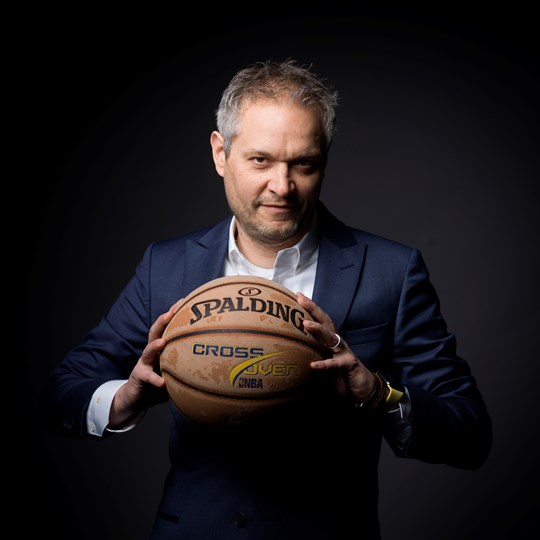“You have to know a lot about a media user in order to be able to offer a good service," says Dieter Boen, Manager Innovation at VRT, in the talk show organised by LCL and Equinix on April 26, 2022. This talk show covered topics such as the changing digital landscape, the influence of the viewer (or listener) on strategy and the role that media ecosystems, innovation and (inter)national collaboration play in the future of broadcasting and media companies. This latter topic in particular is a hot topic in the media landscape and provided interesting talking points at the table.
Control over own data
For years now, there have been fierce debate around the ever-increasing power of a number of large tech players on account of their possessing a huge amount of user data which they then market themselves and sell on to advertisers. On the one hand, the discussion is about the invasion of consumer privacy, which we are trying to protect in Europe with the GDPR, for example; on the other hand, it's about levelling the playing field for innovative start-ups that want to enter the market but who lack sufficient opportunity to do so because of the monopoly position of big tech players.
Giving back control of personal data is a topic that many parties are considering. The Flemish initiative SolidLab comprises research teams from a number of prestigious Belgian universities. The idea behind SolidLab is that you can only reach a socially acceptable solution if you take an interdisciplinary approach. After all, technology, laws, economics, knowledge, attitudes and behaviours need to change simultaneously.
Decoupling of data and services
“The main objective of SolidLab is to enable the decoupling of data and services," says Prof. Erik Mannens, Research Valorisation Director at imec, Professor of Semantic Intelligence at Ghent University and leader of one of the research teams. “This decoupling means that the availability of data is no longer under the control of the big tech players, thus allowing innovative newcomers entry into the market.”

Solid is a technology that makes it possible to divide applications into two parts: A data layer and a services layer. User data is stored in a kind of digital suitcase called a "data pod". The owner of this data pod is the user himself. This user can then decide who gets access to the data pod and can also revoke this access at any time. An individual can have multiple data pods and control access to each one. E.g. data pods for HR data, government data, healthcare data and media data. On the business side, using Solid creates a level playing field as every service provider now has an equal opportunity to request and receive access to the data. This will also allow them to enter the market easily, enabling the best provider to gain ground, and no longer just the companies with the largest amount of user data in their own data silos.
An example
If a consumer buys 2 litres of milk weekly from supermarket A, the supermarket can conclude that the consumer drinks 2 litres of milk per week and create a profile based on that. However, if this consumer also buys 8 litres of milk per week from other supermarkets, the profile does not add up. If all supermarkets can connect to the consumer data pod, they suddenly get an aggregated, anonymised, more complete picture and can create a more accurate consumer profile.
The Flemish government has now invested €7 million in Solid, as it seeks to make it possible for citizens to manage their data through a single portal. “The moment you move house and you report this to your municipality, this move is not automatically reported to other government agencies in many cases (on account of each agency itself owning a copy of that data). So that's where people have to take action themselves. The use of data pods will eliminate the need for this in the future. All government agencies will have access to the same data in one place, i.e. the data pod, and can immediately process it in their systems. That makes it very important for the Flemish government to be involved in this initiative from the outset," says Erik Mannens. SolidLab's ambition is to develop an ecosystem within two years that will enable Flanders to position itself globally.
Application for media companies
A proof of concept of Solid is currently in progress at the BBC and VRT. It is not often that a viewer will read, watch or listen to only one media channel. As a result, the same media company never has a complete picture of its users. Connecting to Solid presents an opportunity to map out a complete user profile, allowing media companies to seamlessly match their offerings to the needs of readers, viewers and listeners. If media companies give the data insights they gain from their users back to them and this data can again be shared anonymously with other media companies via the data pod, this brings 100% user-centric media development closer than ever.
But where does this data go? The Flemish Datanuts company, which aims to increase citizens' trust in data sharing by focusing on responsible and secure data-sharing, wants to bootstrap the ecosystem. As a result, every resident of Flanders will have at least one data pod, containing all government data. That's where data centres play an important role. Because the data will need to reside at a central point, there will be a need for "trusted pod administrators". LCL Data Centers has the ambition, and meets all the requirements, to be this trusted pod administrator for all Belgian media companies.
Want to know more about the SolidLab initiative, Solid technology and the opportunities for media companies? Watch our talk show or contact Robert van Beurden, Media Broadcasting Expert at LCL.